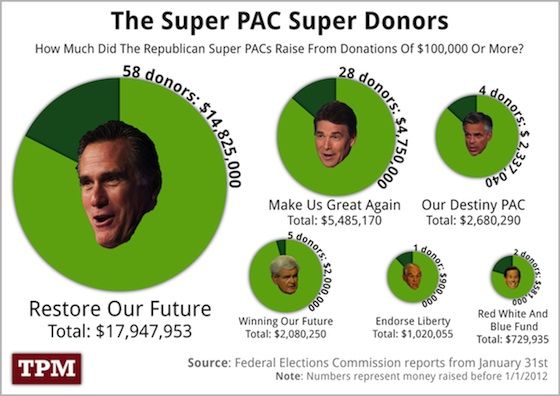This is the first election cycle since the US Supreme Court’s 2010 Citizens United v. Federal Election Commission decision allowed for the creation of Super PACs. According to the latest issue of Harper’s Magazine (March 2012, p. 11), 72% of the advertisement purchases during the 2010 elections would have been illegal before the Citizens United case. (Its source is The Center for Responsive Politics, an outfit that tracks money in politics and is a great resource.) I fully expect the figure to be even higher in the 2012 elections.
Already this year, of the contributors to the six major Super PACs, almost all of the contributions came from people who gave $100,000 or more as this graph from TPM shows, where the light green shows the amount of contributions from such rich donors.
Stephen Colbert also had a piece on who are the big money contributors to the Super PACS.
The Colbert Report
Get More: Colbert Report Full Episodes,Political Humor & Satire Blog,Video Archive
(This clip appeared on February 2, 2012. To get suggestions on how to view clips of The Daily Show and The Colbert Report outside the US, please see this earlier post.)
But at least with Super PACs, the names and amount of donations of contributors are ultimately revealed, though it may come too late for voters. For example, Super PAC contributions up to December 31, 2011 were revealed only on January 31, 2012, after four contests for the Republican nomination had already taken place. USA Today reports that just five people have contributed 25% of all the money contributed to the Super PACs so far, and as Colbert said, just 22 people gave half of all the money. This is a mind-boggling statistic on the huge influence of a few rich people on the electoral process.
Oddly enough, and as per the law on unintended consequences, this access to big pots of money has had the unexpected result of making the Republican election last longer and become more bruising, since a single wealthy backer like Sheldon Adelson can keep alive the candidacy of an otherwise sure loser like Newt Gingrich who under normal circumstances would have long been obliterated by the Romney money machine. Although the oligarchy has a great deal of common interests and goals, there are factions among them and rich people who have a highly specific policy goal, like Adelson with his advocacy of the most hardline Israel policies, now have a means of leveraging their money to keep that issue front and center as long as they are willing to write big checks.
But Super PACs may be already passé as the preferred means for rich people to buy candidates. Since most members of the oligarchy much prefer to do their political influencing work in the dark, flaunting their wealth only in the social sphere, the real action is shifting to groups known as 501c4 organizations because those groups do not have to reveal the names of donors at all. As those who watched the Colbert Super PAC series I linked to would know, big donors who want to remain anonymous can give to a 501c4 group which in turn can donate money to a Super PAC. When it comes to reporting, the Super PAC then can simply list just the name of the 501c4 as a contributor, leaving all of us none the wiser as to who actually gave the money.
You can be sure that the role of secret money is going to be much, much bigger in future elections unless something is done. But as Fred Wertheimer writes, what we now have is a system of legalized bribery of politicians.
Some might argue that politicians have always been bribed so what’s new? But I think that is too cynical a view. As long as something is illegal, it acts as a check against more egregious abuses since there is always the chance, however small, that the illegality will be exposed and the guilty punished. When you make what was once illegal legal, whether it be bribery or torture or governmental murder, you open the floodgates to far worse abuses.


What can be done? The highest court in the land has ruled.
If the system causes so much difficulty that even the oligarchy is discomfited, there might develop a consensus that things need to change. This may cause the US Supreme Court to reverse itself or we may see a constitutional amendment.
Perhaps we need a constitutional amendment (a la occupy wall street) that redefines speech as “not money” and person as “not a corporation”.
Henry Gale @ # 1: What can be done?
Move to Amend has a proposed Constitutional amendment -- and a growing grassroots organization.
“But at least with Super PACs, the names and amount of donations of contributors are ultimately revealed, though it may come too late for voters…”
Keep in mind that for presidential election years, the quarterly filings include a few more dates. There are October 15th and 25th filings that will tell you contributions leading up to the elections (http://www.fec.gov/info/report_dates_2012.shtml).
The concept you are scratching for is the Brandeis Brief, where demonstrable fact can cause a reversal of a previous Supreme Court decision.
So, taken out of context, I would disagree with this excerpt pretty strongly. That logic hasn’t exactly worked in regards to the drug war, hmmm? In so many cases, legalize-and-regulate is preferable to criminalization.
I think there could almost be an argument to apply the same rationale here: Allow unlimited campaign donations, but tighten up the disclosure process so that it all has to be done with immediate public knowledge of exactly who gave how much. Basically make it so that you can legally give as much as you want as long as you strictly follow the disclosure rules, but if you deviate from those rules one iota, then you are fucked.
I’m not necessarily proposing this, but it’s one way of thinking about the problem…